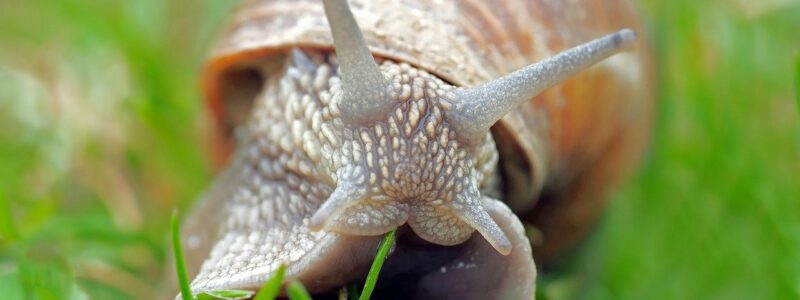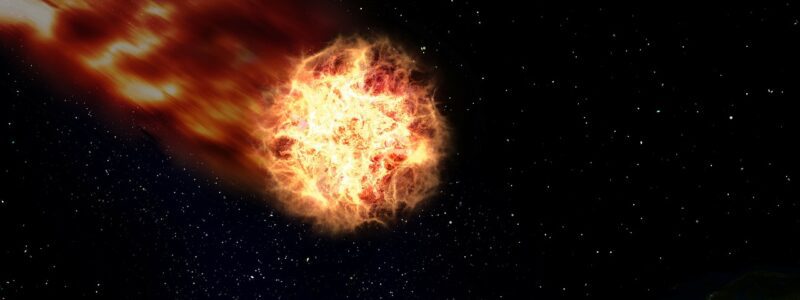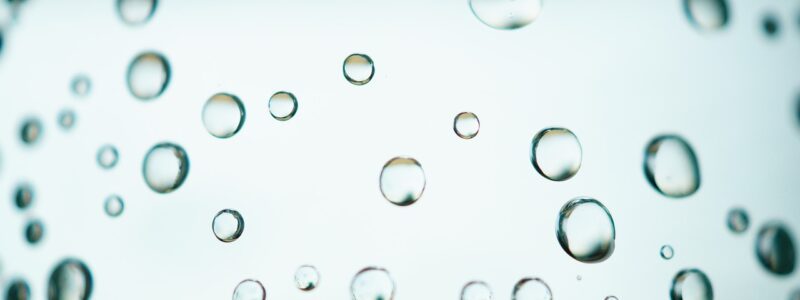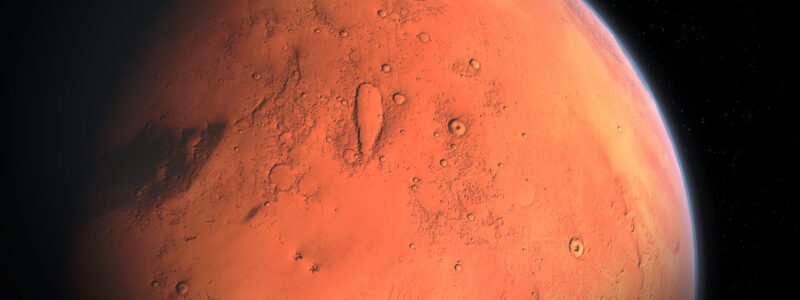Spontaneous Generation
Spontaneous generation is the belief that life can spring from dead material. Belief in the spontaneous generation of life has been shared by many civilizations for thousands of years and took centuries to disprove. It seems to be a common observational event that dead organic material can spontaneously sprout living things, like maggots and bacteria.
Aristotle popularized the concept as noted in his fourth century BC work, History of Animals,
With animals, some spring from parent animals according to their kind, whilst others grow spontaneously and not from kindred stock; and of these instances of spontaneous generation some come from putrefying Earth or vegetable matter, as is the case with a number of insects, while others are spontaneously generated in the inside of animals out of the secretions of their several organs.
Larger animal abiogenesis such as that of lions, rats, and mice took centuries to erode. Support remained for the spontaneous generation of smaller organisms such as insects.
Francesco Redi was an Italian physician who published Experiments on the Generation of Insects showing how maggots did not come from decaying flesh. He made the observation that when decaying flesh was placed in a jar covered by gauze, no maggots appeared. He noted,
Although content to be corrected by anyone wiser than myself, if I should make erroneous statements, I shall express my belief that the Earth, after having brought forth the first plants and animals at the beginning by order of the Supreme and Omnipotent Creator, has never since produced any kinds of plants or animals, either perfect or imperfect; and everything which we know in past or present times that she has produced, came solely from the true seeds of the plants and animals themselves, which thus, through means of their own, preserve their species.
This test could be duplicated by other scientists who also concluded maggots and flies could not come from decaying organic material that was covered.
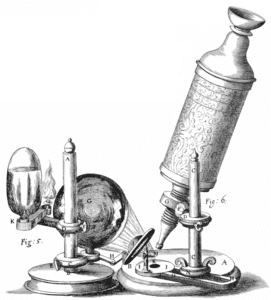
Hooke’s microscope – By Robert Hooke – w:en:Image:Hooke-microscope.png, Public Domain, Link
At about the same time, Robert Hooke’s Micrographia was published which illustrated new organisms only visible through the newly invented microscope. Hooke proposed that the mold he found growing on leather likely was generated spontaneously as he could see no seeds when looking at mold through the microscope. Similarly, he could see no “parents” of the myriad new life forms he found in pond water and concluded they too much arise through spontaneous generation. Hooke’s ideas enjoyed strong support for the next two centuries. It seemed intuitively obvious that small organisms must through the decay of organic material.
No less authority than the grandfather of Charles Darwin argued for the spontaneous generation of tiny microscopic organisms,
From the misconception of the ignorant or superstitious, it has been thought somewhat profane to speak in favor of spontaneous vital production. … There is therefore no absurdity in believing that the most simple animals and vegetables may be produced by the congress of the parts of decomposing organic matter, without what can properly be termed generation, as the genus did not previously exist; which accounts for the endless varieties, as well as for the immense numbers of microscopic animals.
Other scientists noted that the mere soaking of hay in pure water soon produced abundant life without any obvious seeds, eggs, or progenitors confirming the idea of spontaneous generation. It was the consensus of the scientific world that small life arose through the spontaneous generation and this idea was confirmed through observation.
Or so they thought …
Spontaneous Generation, Wine, and Louis Pasteur
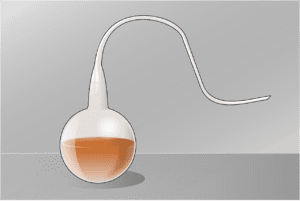
By GYassineMrabetTalk✉This W3C-unspecified vector image was created with Inkscape. – Own work, CC BY-SA 4.0, Link
Wine sometimes spoils when the alcohol is converted to vinegar by certain bacteria. Such transformation spoils the wine and can produce economic devastation for a country such as France.
The French Academy of Science decided to remedy this untenable situation and offered a prize to anybody who could definitively demonstrate whether the bacteria spoiling wine was spontaneously generated or whether it resulted from bacteria that contaminated wine.
The great French scientist Louis Pasteur decided to investigate this matter so important to the French wind industry – and to France itself! He performed an elegant experiment with meat broth in swan-necked bottles. The broth was boiled killing any organisms which might be present within the broth. He was able to show the broth would remain sterile unless it was exposed to the air. Pasteur concluded that even microscopic life could not arise spontaneously. Pasteur wrote,
Never will the doctrine of spontaneous generation recover from the mortal blow of this simple experiment. Ther is no known circumstance in which it can be confirmed that microscopic being came into the world without germs, without parents similar to themselves.
And Then There was Darwin
While the conclusions seemed obvious, the idea of spontaneous generation refused to die. The year of Pasteur’s experiment was 1859 – the same year that Darwin published his monumental book On the Origin of Species. Darwin maintained that somehow life must arise spontaneously – at least the first life. He posited that the first life that arose on the planet did indeed not have parents and that it arose spontaneously – probably through an immense period of time. Darwin noted in a letter written to a friend Joseph Hooker,
It is often said that all the conditions for the first production of a living organism are now present, which could ever have been present – but if (and Oh! what a big if!) we could conceive in some warm little pond with all sorts of ammonia and phosphoric sales, – light, heat, electricity, etc., present, that a protein compound was chemically formed, ready to undergo still more complex changes, at the present day such matter would be instantly devoured, or absorbed, which would not have been the case before living creatures were formed.

Bill Nye – By Montclair Film Festival – https://www.flickr.com/photos/montclairfilmfest/34385561132/, CC BY 2.0, Link
Darwin instantly became a celebrity because he provided scientific weight behind the production of life through an initial spontaneous generation probably developing over many millions of years, starting in some pond somewhere, encouraged by heat and electricity somehow, that produced life which then evolved to all the life forms we know today. This idea became very popular because it obviated the idea of a Creator – Nature would become the creator.
These ideas have remained today. No less authority than Bill Nye (The Science Guy) who had a popular children’s television show, supports the idea of abiogenesis. He managed to write a book chapter entitled “The Sparks That Started It All,” and states,
The origin of life just requires some raw material that could allow the spark of life to emerge.”
The idea of abiogenesis has become a matter of vital importance to naturalist scientists who teach it as fact in public schools even though there is not a scintilla of evidence to support its validity. Special interest groups argue that even questioning abiogenesis in a public school is tantamount to promoting religion – and you certainly do not want to be accused of that!
Modern biology textbooks are written to encourage millions of government public school students to accept the idea of abiogenesis because it is “scientific.” Some examples are as follows,
Because Pasteur’s data were so conclusive – meaning that there was no other reasonable explanation for them – the results persuaded most biologists that the all-cells-from-cells hypothesis was correct. However, you will see that biologists now have evidence that life did arise from nonlife early in Earth’s history, through a process called chemical evolution.
or
Life began when organic molecules assembled in a coordinate manner within a cell membrane and began reproducing. Whether the organic molecules formed on Earth or elsewhere and were transported to Earth within meteors is an open question.
or
Although life as we would identify it has not been created in the lab from scratch, these results support the hypothesis that life could have been formed spontaneously on Earth.
Biochemist Michael Denton makes the observation that such assertions are disingenuous as best. He notes,
Considering the way the prebiotic soup is referred to in so many discussions of the origin of life as an already established reality, it comes as something of a shock to realize that there is absolutely no positive evidence for its existence.
Summary
Even today with all our understanding of molecular biology and the processes that continuously occur in living cells, life has never been produced from scratch – that is, from shelf chemicals. Voluminous textbooks are written about biochemistry and students spend years trying to understand the processes that keep the simplest living things alive.
Life is tremendously complex. The more we understand the processes of life, the more we understand its extraordinary complexity. The processes which occur in any cell are complicated beyond understanding. This is why the production of life from scratch has been an impossible goal.
The more life is investigated, the more extraordinary complexity is discovered. Anybody who has tried to make a complicated piece of machine knows that to get it all working properly is a monumental effort. Greater complexity generally means there are more things that can go wrong.
And yet, many biologists (although certainly not all) expect students to believe in abiogenesis simply because there is no other natural explanation. To even mention under your breath the possibility of Intelligent Design is to commit a scientific sin resulting in ex-communication from the biology community. Abiogenesis is considered a fact simply because it must be a fact.
Of course, this assertion belies the history of science. That history shows many beliefs that were held as true simply because they must be true. For example, it was believed that light waves must travel in waves “through something” just like sound waves must travel through the air. There is no sound where there is no air. This seemed so obvious that the discovery that it was not true to Michelson and Morley truly shocked the physics community to its core.
The assumption that something must be true just because, well, it must be true even though there is no evidence to its truth is not science.
The next chapter will deal with Ventnor and “synthetic life.”


